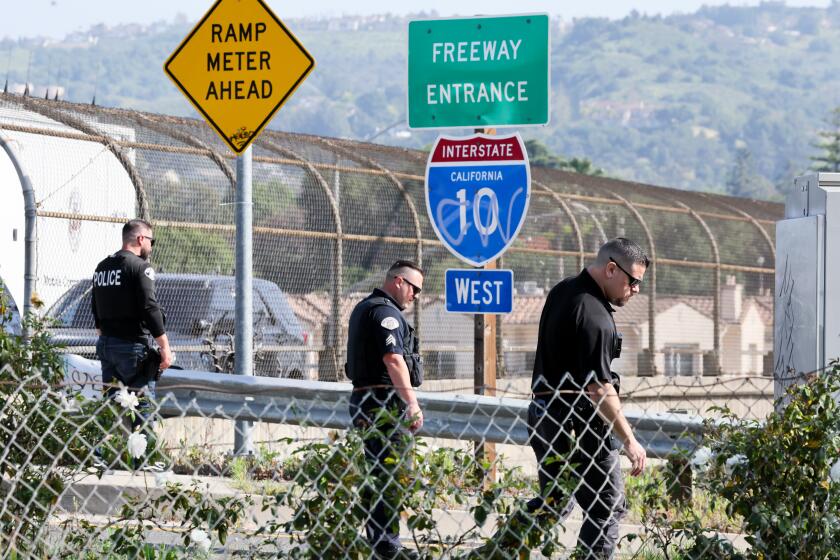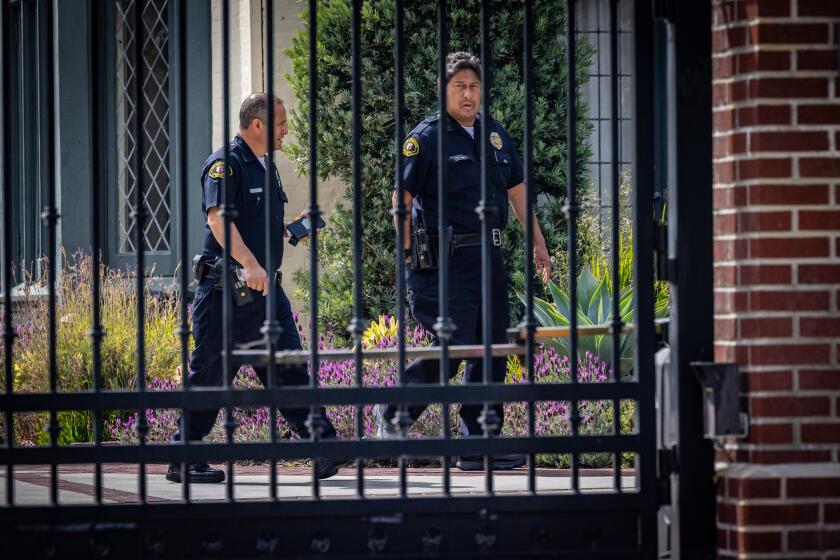Mayor Walks a Fine Line on Border Issue
Los Angeles Mayor Antonio Villaraigosa likes to be liked -- he laughs at his own jokes, enjoys telling stories about himself and he soaks up an adoring crowd. Yet, in purely political terms, Villaraigosa’s best moment in recent days was telling a group of protesting students that they should return to school -- and being booed by them.
“That makes him the voice of reason,” said Ace Smith, a political consultant who helped direct Villaraigosa’s campaign in 2005 and who remains a member of the mayor’s inner circle.
For Villaraigosa, these days of protest have offered huge promise: The streets of his hometown have teemed with hundreds of thousands of men, women and children, energized by politics and overwhelmingly Latino, offering inescapable evidence of the assertive place that Villaraigosa’s political base is claiming in American politics.
At the same time, there is danger for Villaraigosa in being too closely associated with these demonstrations. He aspires to run Los Angeles schools, and as such can hardly champion skipping class. And he covets a national reputation of leadership, a claim that requires him to rise above his own past as a student activist, to show maturity even in the face of a protest whose message he endorses and to demonstrate that he is not captive to ethnic politics or limited to left-wing views.
He got that opportunity Monday afternoon, when he told students he shared their opposition to an immigration bill pending in Congress but wanted them to go back to school; they booed, refused to leave and chanted in defiance. “Hell no, we won’t go,” they called out, yelling over the mayor’s attempts to speak.
Still, Villaraigosa had his moment.
“Somebody’s got to be a grown-up,” he said Tuesday, reflecting on the turn of events that had placed him on the receiving end of an angry student group even though Villaraigosa himself participated in a historic student walkout in 1968. “As a father, I would want my kids to go back to school.”
CNN broadcast part of that exchange, which was widely reported locally as well. The result is that Villaraigosa emerged from the confrontation with an image of resolve rather than of having capitulated to protest.
Although the students resisted his entreaties Monday afternoon, by Tuesday morning, events were falling Villaraigosa’s way. The immigration bill reported out of the Senate Judiciary Committee had been stripped of the provisions that most offended the protesters, and most students had returned to school.
Villaraigosa thus was able to move about a quieting city with a sense of victory, at least in the morning.
During a visit to St. Vincent Meals on Wheels, which distributes roughly 3,000 meals a day to ailing Los Angeles residents who are confined to their homes, Villaraigosa was ebullient. He mugged with workers, donning a paper cap and apron and joining them on a food line before heading out in one of the organization’s food-delivery vans. He scooped pork chops into special plates and worked his way through the kitchen. Employees pressed forward to accept hugs and handshakes.
Relaxed and grinning, Villaraigosa rattled off the history of the program and its executive director, Sister Alice Marie Quinn, whose upbringing and education the mayor recited from memory. “Do I know all these details?” he asked, obviously pleased with himself. “You do,” Quinn replied.
While Villaraigosa was making that ceremonial stop, his efforts to tamp down the student protest were receiving an assist from the weather, as a drizzle turned to a downpour, helping persuade some of the remaining students still protesting at City Hall to call it off. Indeed, just as Villaraigosa took a break from his visit to field questions about the protest, an aide whispered to him that the last students were leaving City Hall.
“That’s good news,” he said.
“They’ve made a statement,” he added. “It’s time to go back to school.”
It did not turn out to be that simple, as more students replaced those who had left and thousands continued to defy the mayor. In the late afternoon, Villaraigosa and other top officials said that about 11,000 students, 8,000 of whom live in the city, had skipped school for the day despite Villaraigosa’s pleas for them to return to class.
They were not the only ones unimpressed by Villaraigosa’s balancing act. One caller to Doug McIntyre’s “McIntyre in the Morning” on KABC-AM (790), suggested that Villaraigosa should be recalled from office for his position on immigration. On that show and others, supporters of tough anti-illegal immigration measures questioned Villaraigosa’s handling of the issue and suggested he was under the influence of immigrant groups and their allies.
Less involved observers were not so critical, but agreed that Villaraigosa will be judged in large measure on how he navigates the politics of immigration. On Tuesday, as he has all week, Villaraigosa strived for an elusive center: He acknowledged the need for national immigration regulations -- “Every country in the world has immigration laws” he reiterated -- but stressed that such laws need to be humane and need to avoid breaking up families.
“This is the first real test for him in some ways,” said Allan Hoffenblum, publisher of a nonpartisan election guide known as the California Target Book. “This is where we discover whether he’s a leader or just another pretty face.”
If the week’s events have focused attention on the complexities of immigration for the Villaraigosa administration, they also serve as a sobering reminder that a mayor controls only a small slice of the public agenda.
Some of Villaraigosa’s predecessors have learned the hard way that it is the unexpected event that can throw a mayor for a loop. Tom Bradley ended a distinguished career on the ropes after the Rodney G. King beating of 1991 and the riots the following year. Richard Riordan was confronted in his second term with the Rampart police scandal, and he struggled to keep his footing during that difficult period. On Monday, Villaraigosa and his top staff had set out to spend the day working over their proposed budget, only to find thousands of students launching a protest.
“These things will happen,” said Ari Swiller, a close advisor to the mayor. When they do, Swiller added, “I think he benefits from ... his own gut and from the people he has around him. His tone is right.”
Times staff writer Cynthia Cho contributed to this report.
More to Read
Start your day right
Sign up for Essential California for news, features and recommendations from the L.A. Times and beyond in your inbox six days a week.
You may occasionally receive promotional content from the Los Angeles Times.







